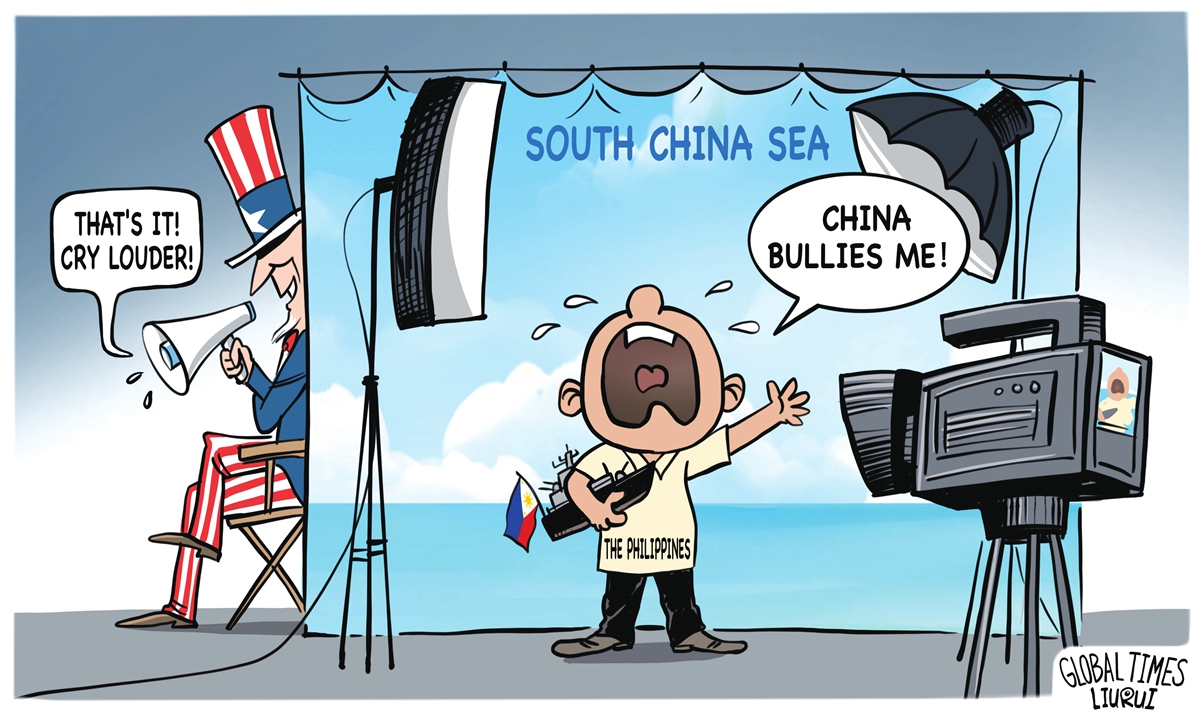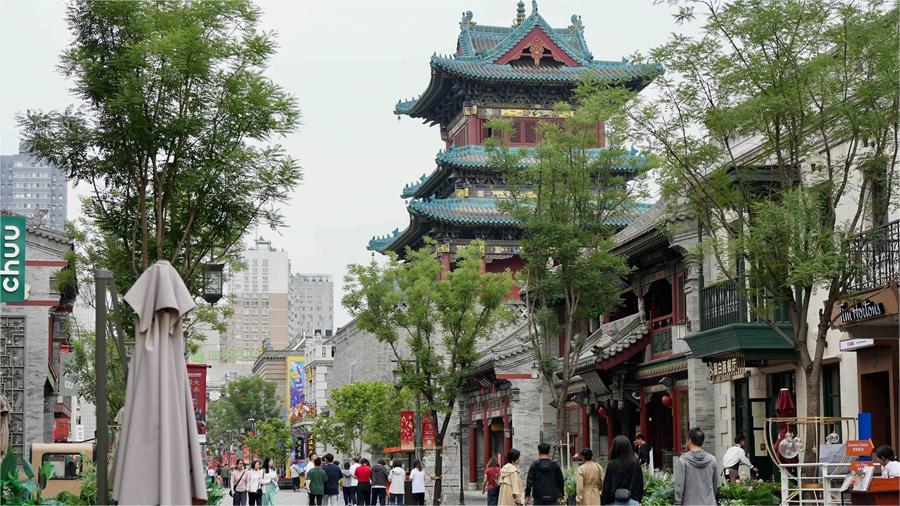US’ support for the Philippines is just psychological comfort

Behind the scenes. Illustration: Liu Rui/GT
On Monday, US State Department spokesperson Matthew Miller commented on the incident that the Philippine vessels illegally entered the waters off China's Ren'ai Jiao (Ren'ai Reef) and deliberately collided with Chinese vessels, smearing China's policy positions in the South China Sea, sensationalizing maritime frictions, and claiming that the US "stands with its ally the Philippines." Deputy Secretary of State Kurt Campbell went even further. He on Tuesday reiterated the US-Philippines Mutual Defense Treaty in a conversation with Philippine Undersecretary of Foreign Affairs Maria Theresa Lazaro and accused China of interfering with the Philippines' "freedom of navigation."
Washington is distorting the truth. The facts of this conflict are clear, and the China Coast Guard (CCG) has responded: the Philippines broke its promise by sending a supply ship and two inflatable boats to illegally enter the waters adjacent to the Ren'ai Jiao of China's Nansha Islands on Monday, in an attempt to deliver supplies to its illegally grounded warship. What's worse, the Philippine supply ship deliberately and dangerously approached and collided with normally sailing Chinese vessels. CCG took control measures in accordance with the law, including issuing warnings, intercepting, boarding and conducting inspections, and forcibly driving them away, actions which were reasonable, lawful, professional and standardized.
The provocation from the Philippines is a repetition of old tricks, and the statement from the US State Department and its officials is nothing but a cliché. The US' stance pretends that it is still the "world's police" and the master of the Asia-Pacific region. In fact, the unrest in the South China Sea and the Philippine provocation in Ren'ai Jiao cannot be separated from the incitement and support of the US. As an external force, the US manipulates camp confrontations for geopolitical purposes and advances military deployments and actions in the South China Sea, which is the root cause of the escalation of disputes and conflicts in the region.
On Monday, the US Pacific Fleet announced that the US, Canada, Japan and the Philippines conducted a two-day maritime cooperative activity in "the Philippines' exclusive economic zone" from Sunday to Monday. The US Pacific Fleet said the maritime cooperation activity aimed to "uphold freedom of navigation and overflight, reaffirming the four nations' commitment to bolstering regional security and stability."
Chen Xiangmiao, director of the World Navy Research Center at the National Institute for South China Sea Studies, told the Global Times that the US supports the Philippines in continuously conducting bilateral or multilateral exercises in the South China Sea, with the actual purpose of creating an illusion of high unity between the international community and the US and attempting to isolate China. Meanwhile, the escalation of military cooperation between the US and the Philippines may deepen the Philippines' dependence on US military aid. The Philippines seems to get the backing of the US, but in reality, the Philippines may further fall into the trap of US military aid and become an "ATM" for the US.
With the support of the US, the Philippines' policy toward China has completely shifted toward Washington, supporting its strategic confrontation with China in the South China Sea. However, the Philippines' intention to confront China is unrealistic. Firmly binding itself to the anti-China bandwagon of the US only makes the Philippines insecure. In the South China Sea issue, although the US frequently mentions the US-Philippines Mutual Defense Treaty in an attempt to threaten China, the US will not take risks to provoke a war in the South China Sea for the interests of the Philippines.
Ding Duo, deputy director of the Institute of Maritime Law and Policy at the National Institute for South China Sea Studies, believes that the US-Philippines Mutual Defense Treaty is just a few pages of paper that brings some psychological comfort to the Philippines. Considering the current international situation and the political background of the upcoming US presidential election, Washington cannot help but worry about "accidental conflict" in the South China Sea. Chen stated that the US' main goal is to see tensions escalate between China and its neighboring countries, hoping to create chaos around China to contain China's growing influence.
In the South China Sea issue, the US plays the role of playwright, director, and absolute protagonist, while the Philippines only plays a subordinate role, lacking real discourse power, initiative, and dignity. The biggest tragedy for a pawn is to think that it can control the situation.
Recently, Reuters revealed that the US military launched a campaign to smear Chinese vaccines in the Philippines during the COVID-19 pandemic, preventing the Philippines from obtaining safe and reliable vaccines. The Philippines should wake up. If this strong "wake-up call" still cannot make it realize how selfish and self-serving the US is, the Philippines will only find itself in a desperate situation, and pay a higher price.
Photos
Related Stories
- U.S. Secret Service agent robbed at gunpoint during Biden's California trip
- Worsening groundwater loss threatens U.S. Southwest despite record snowfall: report
- Peace lost in Blinken's another failed Mideast trip
- Pro-Palestinian protesters take over student services building at California State University, Los Angeles
- California university moves classes online after demonstrations over conflict in Gaza
- U.S. Fed holds rates in place, predicts one cut this year
- U.S. opposes some changes asked by Hamas concerning latest ceasefire proposal
Copyright © 2024 People's Daily Online. All Rights Reserved.









